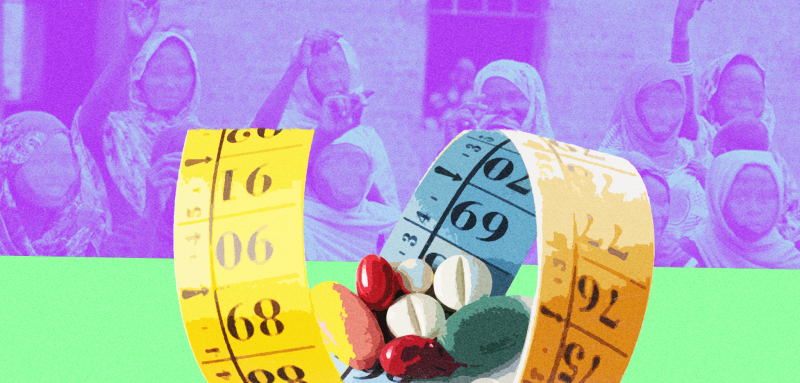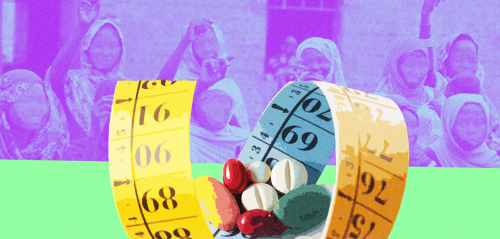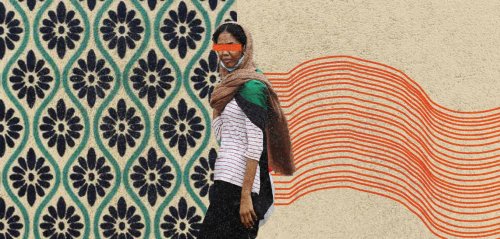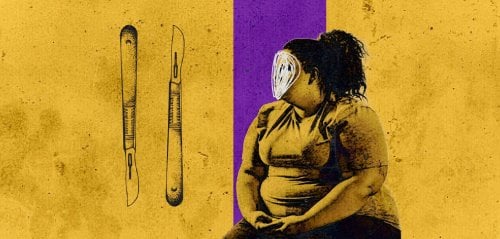For two years, Hala el-Tayeb has been going to the doctor on a monthly basis to treat her menstrual disorders that have been caused by taking weight gain pills, paying the high price of not being able to have a child despite having been married nearly three years ago, on June 13, 2020.
Hala, 24, took steroids for an entire month before her marriage, which increased her weight, but led to the risk of menstrual disorders amid fears that they will develop into kidney failure. She is currently working on establishing a civil institution to combat the use of fattening pills, or weight gain drugs. This type of pill is locally known as al-Najmah, which is the most common name among the many given to fattening drugs in Sudan.
The eagerness of girls, especially those about to get married, to take weight gain drugs dates back to the old belief that excess body fat is a symbol of wealth, and men preferring overweight women for their good health, says social researcher Nasser Farouk
Rising demand despite the harm
Samaher al-Mubarak, a prominent leader in the Pharmacists Union Association, says that weight gain drugs are often derivatives of cortisone that are dispensed by doctors for specific medical conditions according to certain doses and based on individual medical examinations. She adds that to stop taking the drug, the process must take place in a specific gradation – according to each case – due to the risk of serious withdrawal complications, which include kidney failure and may reach loss of life in a large number of cases.
Speaking to Raseef22, she points out that the side effects of cortisone or steroid derivatives are weight gain, and are usually taken for this purpose in high doses without any medical follow-up, and this explains the causes of fatal diseases for those who use these drugs without medical advice.
In Sudan, weight gain drugs are sold in shops that sell women's clothing and cosmetics illegally and without medical prescriptions, in addition to being available in pharmacies, according to pharmacist Hisham al-Taher, who works in a pharmacy in the capital Khartoum. He tells Raseef22 that by virtue of his work and touring a number of states, he has noticed that these drugs are sold more in the outskirts.
He recounts how these drugs are usually placed in small boxes, with no accompanying information on how they should be used or their medical risks, and yet there is a high demand for them from girls who do not even try to bargain on their prices. This means that their desire for them makes them turn a blind eye to their potential harm and fluctuating prices, which in some areas reach 700 pounds (one dollar and twenty cents).
The use of fattening drugs result in complications such as menstrual disorders, kidney failure, changes in body proportions, and stomach ulcers, and their risk and severity increases depending on the amount the girl has taken, according to al-Taher.
The failure of oversight
Samaher al-Mubarak says that weight gain drugs are a dangerous phenomenon, with a negative impact on public health, society, and the health system. She states that being overweight according to BMI (body mass index) measurements, is in itself an unhealthy phenomenon and must be handled with caution because of the health complications that accompany it.
These drugs reach Sudan via smuggling through many outlets, aided by political and security turmoil in the region. Speaking on this, al-Mubarak says, "Weight gain drugs of various popular names are imported through unofficial channels, and they are often not registered with the regulatory authority, nor do they pass through known and controlled official drug channels to ensure their safety and effectiveness.
The Sudanese state is not serious about combating weight gain drugs, as they are sold openly in markets and boutiques without the slightest regard for their dangers
She denies the sale of these drugs that are used inappropriately for weight gain in pharmacies, and said that they are sold illegally in women's clothing stores and cosmetics markets, stressing again that most of them are not originally registered with the National Council for Drugs and Toxicology (the government institution responsible for licensing the sale of medicines in Sudan), as they are dealt with without any medical supervision, whether in prescribing, in selling, or during use.
The authority knows that it does not have control over the pharmaceutical sector, especially those that are smuggled, and the Secretary-General of the National Council for Drugs and Toxicology, Ali Babiker, acknowledges that there are challenges facing "drug control, partly due to the common borders that some states have with neighboring countries, which contributes to the entry of smuggled and adulterated medicines,” while pointing out that a plan will be drawn up aimed at strengthening the oversight work within the states.
But Samaher al-Mubarak says that the state is not serious about combating drugs that are taken for weight gain, as they are openly sold in markets and boutiques without the slightest regard for their dangers and are sold outside the pharmaceutical institutions licensed to circulate and preserve them in an appropriate manner.
She says that the Professional Pharmacists Association of Sudan advises those who wish to increase or lose weight to exercise and follow an appropriate diet after consulting specialists, calling on girls to not take any drugs without medical advice.
Historical roots of weight gain
Social researcher Nasser Farouk tells Raseef22, that the eagerness of girls, especially those who are about to get married, to take weight gain drugs dates back to the old belief that excess body fat is a symbol of wealth and prosperity, leading to men's preferences to lean more towards overweight women because it means they are in good health.
He explains that every family in the past was keen on feeding their daughters well in the months before marriage, and would prepare traditional foods and dishes for them like: "Madeeda Hilba (Sudanese fenugreek porridge), Al-Akkara, Um Jungar (creamy millet), and other local foods”.
Farouk adds that fattening a soon-to-be-married woman is a culture that the Sudanese took from Arabs who were suffering from the hardship of living in ancient times, and this made obesity a measure of female beauty. He refers to older women who have ingrained this custom with sayings such as “Paint your skin, wear long, dragging robes, and eat in abundance”.
Here, “paint your skin” means moisturizing the body with oil in order to attract the husband's interest, while “wear long, dragging robes” means letting the dress drag across the ground in order to drain the man financially in buying soap, whereas “eat in abundance” here urges her to eat a lot in order to improve her health. He says that these teachings are one of the foundations that the wife follows to fight polygamy.
But what has now emerged is the replacement of natural, healthy foods, with chemical ones for the same purpose.
Hadeel Abbas (pseudonym), is a 22-year-old who is about to get married in a few months. She refuses to eat fattening foods and local remedies, especially adding fenugreek in any type of food because she is afraid of its pungent smell. Hadeel tells Raseef22, "What you call natural foods needs time that I do not have to show their effects, while drugs have an effect that quickly shows on the body."
Hadeel takes topical weight gain drugs, because she cannot tolerate her friends shaming her for her think physique. But she did not consult her family or fiancé for fear that they would stop her from taking them. "My fiancé probably won't object to this, as he always criticizes me for my slenderness," she says.
For her part, activist Israa al-Sheikh believes that a culture that sets specific standards for women's beauty is the main motivation for taking these drugs. This phenomenon, which is abundant among media presenters and popular artists, makes others imitate them, and has become part of people's subconscious.
Raseef22 is a not for profit entity. Our focus is on quality journalism. Every contribution to the NasRaseef membership goes directly towards journalism production. We stand independent, not accepting corporate sponsorships, sponsored content or political funding.
Support our mission to keep Raseef22 available to all readers by clicking here!
Interested in writing with us? Check our pitch process here!







